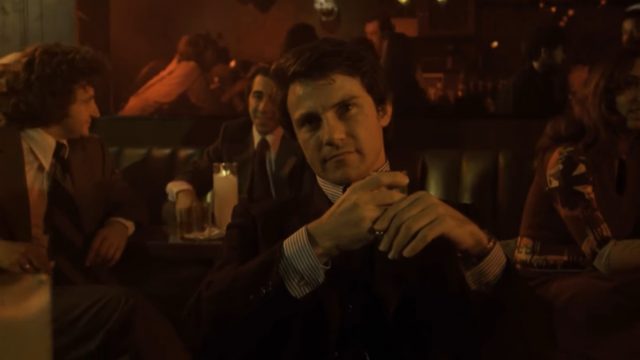There’s a fairly common joke about how many debut novels are about introspective white guys with acoustic guitars hitchhiking across America, and I believe Mean Streets, despite being Martin Scorsese’s third feature film, draws from the same kind of impulse that leads to those novels. Famously, Scorsese had finished up shooting Boxcar Bertha for Roger Corman when John Cassavetes told him “You’ve spent a year of your life making a piece of shit,” and Scorsese was inspired to go on and make Mean Streets. More specifically, I think he wanted to put every single cool thing he’d ever seen and done and thought into a single hundred-minute movie. Part of that joke about the white guy novels is that they’re written by thoughtless, creatively bankrupt, self-absorbed idiots who had never seen or done or thought anything interesting in all their lives, and luckily for us none of those things are true of Scorsese, and so uncut, unpolished Scorsese is still pretty fun to watch.
I mean, on a basic level, the action itself is interesting; many of the individual scenes were lifted from what Scorsese had seen out of his bedroom window as a kid, and you have to work pretty hard to mess up talking about the coolest thing you ever saw. Life experience is a good substitute for creativity. But I think Scorsese is genuinely creative enough to fill in the gaps – to imagine what these guys’ lives were like outside of the moments he saw them. In fact, I think it demonstrates the value of genre to young storytellers – to go beyond “I have to write this for the plot to make sense” and into “I get to write and direct this kind of scene”. Scorsese gets to put on the costume of a gangster and pick fights and get drunk and high off his tits; we get to feel his thrills through him.
Beyond this is the clear-eyed mentality that holds scenes together like glue. I don’t think even Scorsese would peg himself as a deep thinker, and I don’t think it’s necessary to be one in order to be a good storyteller or good human being. I do, however, think a certain level of introspection is a necessary and healthy part of living (one cannot recognise oneself if one never takes the time to look in a mirror), and I have a deep respect for what Scorsese does, which I would characterise not as deep thinking but deep feeling, a constant checking-in of his emotional register. This kind of work is necessary to avoid falling into negative emotional places, to recognise the difference between a short-term impulse and a strong emotional reaction (practical example: Scorsese knows better than most that snorting coke feels good, but kicking a coke addiction feels even better).
Where Mean Streets falls down is the same central plank of the failure of those white guy novelists: over-identification with the central character. I think Charlie is the most Scorsese-like protagonist, because so much of what he does as a character is what Scorsese does as a director – he acts as a witness to the events of the movie (there are so many cuts to Charlie simply reacting to what’s happening around him, even when he’s not a part of the action), and coming out feeling exhilaration and fear and joy and guilt. The Mary Sue phenomenon comes from storytellers putting their impulses in a character and letting them get away with it; I think in this case Scorsese is giving perfectly good storytelling impulses (sit back and observe the action passively) to an actual character – by the time he got to Taxi Driver, Scorsese would be able to tell an actual story about a man who has a habit of sitting back and observing.
He would also start getting to the point quicker. The overall arc of the story is many loose observations and thrilling beats of ownage that suddenly explode into the violent, horrifying climax; by the time Scorsese came back to the exact same story in Goodfellas, he could expertly compress the same arc into a single scene, and then take it even further – Tommy murdering Spider is what I’m thinking of here, a smaller link in the larger chain of the rise and fall of Henry Hill. Like all great artists, I think Scorsese looked at what worked, what didn’t, and how he could do the former more and the latter less. This is a quality I admire in him, and hope to live up to.


